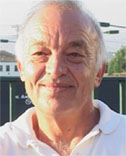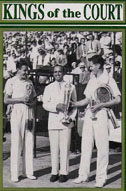Rod Laver
By Ed Atkinson
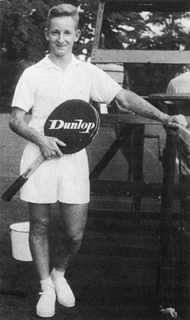 |
Rodney Laver. The only two time Grand Slam winner in history. He came from Rockhampton a little town in Queensland , Australia . He had two older brothers that played quite well. His mother and father competed and played. The family had a court in the back yard made of clay, so it was natural for young Rodney to go out and beat the ball around. He was the first really great lefty. He was blessed with incredible speed. He had every conceivable shot. His timing was great. He had a devastating forehand. Many observers felt he was the most dangerous when he was on the run, especially on the forehand side. He had a better than average serve, a very good volley and a very sound overhead. |
Laver started playing with his parents and family on the family backyard clay court. |
He had a wonderful slice backhand, and his topspin backhand was eventually his best shot. Once he was able to master the topspin backhand, he became that most dreaded of opponents, one without a weakness. Laver's two Grand Slams were not without their anxious moments. In 1963, he was actually down 2 matchpoints to Marty Mulligan in the fourth set at the French. In the 1969 Australian, he played Tony Roche in the semi-final in a four hour match in the humid climate of Brisbane , finally wining 6-3 in the 5 th, after losing the fourth set 22-24. |
|
Laver's devastating forehand was even more dangerous when he was on the move. |
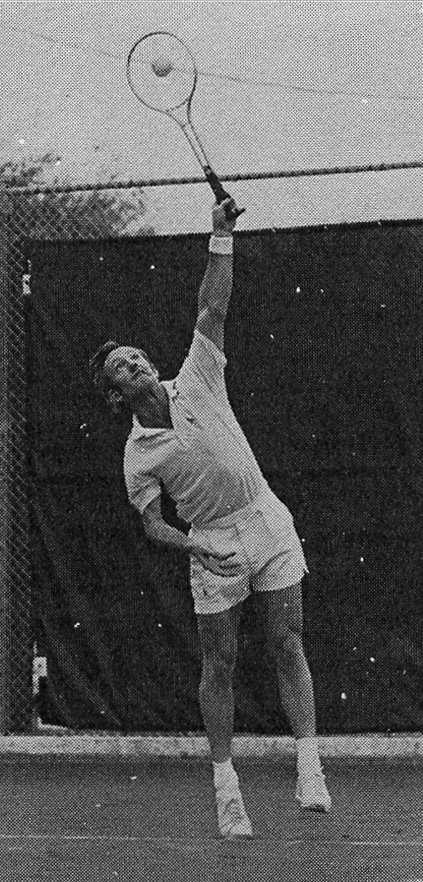 |
Laver himself thought his greatest win in the year of his second Slam was beating Ken Rosewall in the French final in three straight sets. Said Laver, "For me to beat Ken on clay in straight sets was quite unusual. I played, I thought, the best tennis I'd ever played on the clay. I felt ten feet tall." At Wimbledon in 1969 he had another incredible escape against the Indian player Premjit Lall. Playing him on an outside court, upset by the noise and distractions, Laver went down 6-2, 6-2, 3-0. But as was so often the case, Laver saved his best tennis for what appeared to be the darkest hour, suddenly reversing the momentum and sweeping through the rest of the match without losing a single game. Said Laver with his typical (hugely) understated modesty: "It's something that you work through." In the Wimbledon final, Laver beat John Newcombe, just as he had in 1968: "To play the very best in the final of the best tournament in the world, it's a wonderful achievement and emotionally inside you feel that you've really accomplished a great deal." At the U.S. in 1969, the final between Laver and Tony Roche was rained out on Sunday. The tournament used a helicopter hovering over the court to try to dry it for the match on Monday. |
Laver's serve was better than most players despite his relatively small stature |
|
|
But the grass was still soft, which equalized the two players at the start. Laver lost the first set 9-7. But from then on went on to play a different brand of tennis, going on to complete the Slam by winning the next three sets: 6-3, 6-1, 6-2. Said Laver, "For me lady luck was riding and it was meant to be." Beyond his obvious physical gifts, Laver had another essential quality that set him apart: the heart and determination of a champion. Said Bobby Riggs: "I loved his temperament, his fighting heart and his all around game." |
Once mastered his topspin backhand was Laver's best shot throughout his career. |
Laver and the other great players profiled in the series were masters of the all court game. They subscribed to the maxim that fortune favors the bold and they fully understood that the geometry of a tennis court dictates that points be finished at the net. With the exception of Bill Tilden, all these players turned professional in their early 20s and were therefore barred from participating in the amateur Grand Slam events. In addition, the onset of World War II brought competitive tennis to a standstill for six years. These great champions missed years of opportunities to accumulate additional Grand Slam titles. Had they competed in the Slams throughout their careers, they might have won staggering numbers of titles, far exceeding the record of 14 set by the great Pete Sampras. Of course, we will never know what could have been. These great players--truly kings of the court--have passed into history. Many feel that we will never see their like again. |
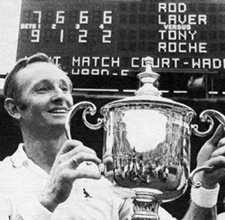 |
| After the second Slam at Forrest Hills |



